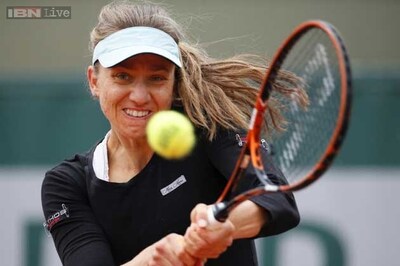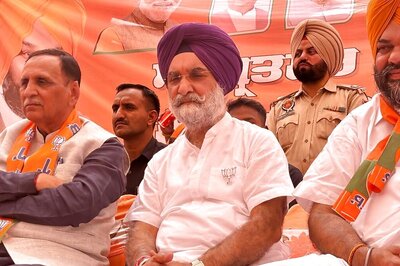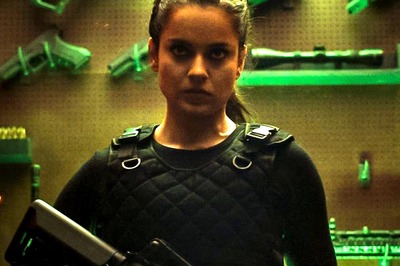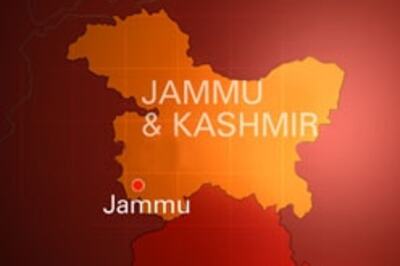
views
Beirut: Syria's government, facing sanctions for killing thousands of protesters, agreed on Monday to let foreigners monitor its compliance with an Arab League peace agreement intended to promote political dialogue.
The main opposition to President Bashar al-Assad dismissed as a further stalling tactic an agreement which Damascus said was prompted by advice from Russia, a rare, powerful ally, which has shown signs of losing patience. Syria's foreign minister also said he had wrung concessions from the League, noting that the monitors would, initially, have access for just a month.
Iran, Assad's key partner in a region where Syria's nine-month-old "Arab spring" uprising risks upsetting a complex balance of power, said it found the agreement to let in observers from the Arab League "acceptable", if not ideal.
As the violence continued on Monday, with several people reported killed, the Arab League said it was not ready to lift economic sanctions it imposed to cut short Syrian prevarication.
However, an advance party would reach Damascus this week.
It would prepare a mission to monitor compliance with an agreement that calls for troops to withdraw from cities where protests have been held, to free political prisoners and to open a dialogue with opponents, most of whom are set on following the example of Egypt and others in ending decades of one-man rule.
Insisting that Syria had not been forced into submission, Foreign Minister Walid al-Moualem said that he had won several unspecified modifications before signing.
"If we hadn't inserted these modifications at the heart of the protocol we would not have signed it, whatever the warnings and threats," he told a news conference in Damascus.
The remarks were broadcast on Syrian television. Most foreign media have mostly been barred from Syria this year.
The exile leader of the opposition Syrian National Committee lambasted the deal: "Syria's signature of the Arab League agreement is a lie aimed at winning time and preventing the League from resorting to the United Nations," Burhan Ghalioun told reporters in Tunisia.
Another opposition figure, Samir Aita, said, however, that he hoped the accord on foreign monitors would help stem violence: "This is a turning point," he said.
"When the observers are there, there can be peaceful demonstrations and the uprising can get back in the major cities to its peaceful civic stand."
While many Arab League rulers take little more heed of public opinion than Assad, the grouping is anxious to calm the situation in Syria and avoid a civil war that could unsettle an entire region already riven by rivalries between Shi'ite, non-Arab Iran and Sunni Muslim Arab powers like Saudi Arabia.
Syria broadly agreed last month to the Arab League initiative to defuse a violent confrontation that has left more than 5,000 people dead. Damascus reports losing over 1,100 of its security forces to foreign-backed "armed terrorist gangs".
After Syria balked at signing the protocol on monitors last month, Arab foreign ministers voted to impose sanctions on Damascus and threatened last week to take their proposal to the U.N. Security Council - a move that could expose Damascus to wider international action.
Sanctions
Arab League Secretary-General Nabil Elaraby said that sanctions had not been lifted, and said that an Arab foreign ministers meeting planned later this week to discuss action against Damascus had been "postponed indefinitely".
Syria's Moualem told journalists that Syria had not requested and end to the sanctions.
"If they think the sanctions will affect Syrian's resistance then they are dreaming, and we won't beg anyone," he said.
He said Damascus agreed to sign the deal on the advice of Russia, its long-time ally and arms supplier.
Moscow took a step closer to the Western position last Thursday with a surprise draft resolution at the United Nations which stepped up its criticism of the bloodshed in Syria.
Western countries complained the text was still too weak but the move may offer more opportunity for international measures, although foreign powers deny plans for intervention. The complex power balance in the Middle East makes Syria a far riskier place to intervene than sparsely populated Libya in North Africa.
Analyst Nadim Shehadi from Chatham House in London said the protocol signing on Monday would not ensure survival of the Assad family's 41-year rule but could let violence drag on.
"The situation in Syria is irreversible so there is no way any external actors can change it, or that the regime can regain its power," he said. "Anything like that would decrease the pressure may result in prolonging the process making it more costly in terms of lives."
No action without Syria
The Arab League's Elaraby said an advanced team led by a top official from the group would head to Syria in two or three days to prepare for the arrival of monitors, which would include journalists and security officials.
Syria said it would allow observers to enter flashpoint provinces under its protection, but that the deal requires Syria and the Arab League to agree on responses to any proposals by the monitors, who will initially be allowed entry for one month.
"The Arab League delegations reports will be sent to me and the League's secretary-general at the same time, and he and I will discuss them before any other action is taken," the foreign minister said. "That is the text after Syria's modifications."
Areas such as southern Deraa, central Homs and northern Idlib have become centres of armed rebellion with dozens of protesters, rebels and security forces killed each week.
The British-based Syrian Observatory for Human Rights said three people were killed on Monday by security force fire in Deraa province.
It also said three soldiers died in fighting with armed rebels in Idlib province, while state news agency SANA said security forces in the same province killed at least one and wounded several other "terrorists".



















Comments
0 comment